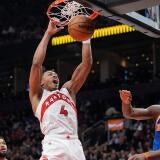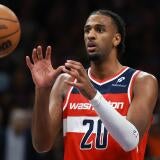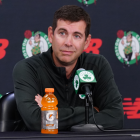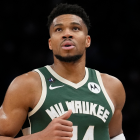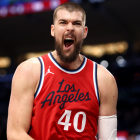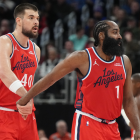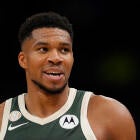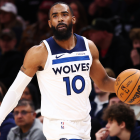
James Harden trade rumors: Why the Nets shouldn't deal for the former league MVP who wants to play for them
There's more to winning a championship than accumulating talent

James Harden is, at worst, one of the 10 best players in the NBA. As a rule of thumb, when one of the 10 best players in the NBA wants to play for your team, you should trade for him. There are only 10 of them in basketball, after all. Having one usually leads to contention. Having two just made the Los Angeles Lakers the champions. Having three puts you in rarefied air. It's been done only a few times in NBA history, and now, the Brooklyn Nets might have a chance to join that exclusive club.
Harden's Rockets are coming apart at the seams. Star teammate Russell Westbrook reportedly wants out. A number of role players are frustrated. His coach and GM both left. And now, with two years remaining on his deal, Harden is reportedly mulling exit strategies of his own. According to ESPN's Adrian Wojnarowski, Zach Lowe and Ramona Shelburne, he has eyes on Brooklyn as his next landing spot should he decide to move on. Former teammate Kevin Durant is already there, and he brought All-Star point guard Kyrie Irving with him in 2019. Both have been top 10 players in the past. Both could conceivably rejoin Harden on that list next season.
Conventional wisdom dictates that putting them together would create an overwhelming championship favorite. New Orleans Pelicans guard Josh Hart has already crowned the trio as the 2021 champions should they manage to unite with the Nets. On paper, they're juggernauts. In reality, they're paper tigers.
Given the current construction of their roster, the offseason landscape ahead of them and the competition they're likely to face in pursuit of the 2021 championship, the Nets are the rare team that shouldn't trade for the top-10 player who wants to play for them. There are three principle reasons why.
So let's game this out to explain why exactly that is. Pretend for a moment that the Rockets are willing to trade Harden, and that the Nets can offer the best package in the field. Assume for the sake of argument that the package resembles the one originally reported by Farbod Esnaashari: Caris LeVert, Spencer Dinwiddie, Taurean Prince and Jarrett Allen. We'll throw the No. 19 pick and Brooklyn's 2022 first-rounder into the deal as well to get the Nets closer to what other teams can offer. Assuming the Nets still decline Garrett Temple's $5 million team option as they are reportedly expected to do, that would leave them with the following eight players as a starting point for their 2020-21 roster:
| Players | 2020-21 Salary |
|---|---|
James Harden | $40,824,000 |
Kevin Durant | $40,108,950 |
Kyrie Irving | $33,329,100 |
$10,375,678 | |
$2,002,800 | |
$1,824,003 | |
$1,780,152 | |
Nicolas Claxton | $1,517,981 |
Total | $131,762,664 |
This starting point, even factoring in likely offseason moves, would leave the Nets sorely lacking in the three D's: depth, defense, and diversity on offense.
1. Depth: The Nets have three stars and not much else
Of those eight players still on the roster, three can be relied upon for something resembling star-level production when on the court. A fourth, Jordan, is a low-level starter at this point. Valuable, but not overwhelmingly so. Five players must be on the court at all time. A typical NBA team uses nine or 10 regularly. Luwawu-Cabarrot was signed off the scrap heap before the bubble. The duo of Musa and Claxton have played 713 total NBA minutes, though Musa is reportedly being dealt to the Detroit Pistons for Bruce Brown. Kurucs has played more, but after starting 46 games in his rookie season, he saw his role slashed significantly last season. He is also being investigated for domestic violence. It's not out of the realm of possibility that any could be contributors, but none should be relied upon.
So where are the other five or six meaningful players coming from? Sharpshooter Joe Harris probably fills one slot. The Nets have his Bird rights and an owner equipped to pay the luxury tax. Pencil him in here. After that? Things get murky. The Nets are going to be a tax team. That limits them to the smaller taxpayer mid-level exception of around $5.7 million. That could get them a contributor, but most of their true targets are likely to get bigger offers from more flexible teams. The Nets would love to reunite Harden and Durant with Serge Ibaka at power forward, for instance, but there's no way he makes it through free agency without getting offered at least the non-taxpayer mid-level exception. More realistic options at that spot would likely be players at different points on the age curve. Maybe the Nets could take a swing at a high-upside youngster like Derrick Jones Jr. Maybe they'd hope to milk the last few productive seasons out of Paul Millsap. But odds are, they aren't finding a starter in his prime in this slot.
The last leftover chip Brooklyn would have in its arsenal would be salary aggregation. Pair those four smaller salaries and the Nets could trade for someone more expensive. As a taxpayer, they'd be limited to taking in 125 percent of the outgoing salary, but between Musa, Kurucs, Claxton and Luwawu-Cabarrot, that's over $8.9 million in salary. Attach some draft capital and that might be able to net another high-end bench player or low-level starter. This number could be higher with Temple's $5 million added to the mix, but it seems as though they've chose to decline it.
That takes us to seven probable rotation players before the Nets have to start gambling on minimum-salary veterans. Even a normal three-star roster would be thin under these circumstances. This is absolutely not a normal three-star roster.
Durant and Jordan are both 32 years old. Harden is 31. Irving has missed nearly 27 percent of the regular-season games his teams have played during his career. He is currently recovering from shoulder surgery. He's had a number of knee injuries. Durant is recovering from a ruptured Achilles tendon. Even if you assume all four are healthy in time for the playoffs and even if you assume there is no age-related performance decline, it is a near certainty that the foursome misses a meaningful amount of regular-season games, especially in a condensed season. Any hope for home-court advantage the Nets might have had dies with this trade. Of course, with their defense, it might not even matter where they play.
2. Defense: Where on Earth is it coming from?
The notion that defense wins championships is somewhat overstated. Champions don't need a great defense to win it all, but they do need a good one. Among the 21 teams to win a championship this century, 20 had top 11 defenses. The lone exception boiled down to effort. The 2001 Lakers finished 22nd, but there was no reason to believe they were dealing with any sort of roster or schematic deficiency. They had the NBA's best defense a year prior, matched that feat in the postseason and finished seventh in completing their three-peat a year later. The 2001 Lakers were the exception. They were bored.
The Nets, at the very least, face a talent deficiency. There isn't a single player on this roster immediately slated to provide significant defensive value. Irving ranked 76th among 95 point guards in ESPN's Defensive Real Plus-Minus last season. Harris finished 37th among small forwards. Jordan ranked 36th among centers. Most metrics paint a similar picture. Irving is, and largely always has been, a poor defender. Harris and Jordan are somewhere in the wide range of mediocre.
Durant was quite good for stretches in Golden State. Without knowing how much mobility his injury cost him, it would be unfair to project a return to form on that end. The numbers have been quite kind to Harden in recent years. He ranked 12th in DRPM among shooting guards last season, but that's explainable schematically. Remember when Harden's defensive gaffes were a social media staple? That's when he used to defend the perimeter. The Rockets wisely leaned into his strong post defense and planted him near the basket, building a switch-heavy scheme around him to hide the weaknesses that once made him a laughingstock.
This is where Brooklyn's possible schematic deficiency comes into play. The Rockets were able to keep Harden in the post last season because they didn't play centers. The one they had before making that pivot, Clint Capela, switched pretty comfortably onto the perimeter. Jordan doesn't. Even at his peak, he was never a particularly switchable defender. Lately, he's handcuffed himself to the basket as much as any other big man in basketball. Even a best-case scenario in which Harden defends power forwards likely takes him out of his comfort zone down low more than he'd like. If certain lineups force him to defend guards again? It isn't going to go well.
Jordan's immobility practically forces the Nets to play dropback coverage on defense. The past several postseasons suggest that doing so is a liability against great offenses. Harden has given Rudy Gobert problems in the playoffs. Similar offensive players would do far worse to Jordan. The Nets could take him out, and in the process moving Harden into a more comfortable defensive role, but as we've covered, the Nets wouldn't have that many good players. They can't exactly afford to abandon one of the few that they have. Even if they manage to find two stellar defenders through their mid-level exception and a trade, the fact that they are likely playing so many average or worse defenders limits their upside. They might not finish last on defense, but they aren't finishing close to 11th, either.
With all of this in mind, let's try gaming this out for a possible Finals matchup with the Lakers. The version of LeBron James we just saw in the playoffs can defend Durant. Are we certain that a post-injury Durant can defend James? Alex Caruso and Kentavious Caldwell-Pope are hardly shutting down Irving and Harden, but they're above-average defenders that can hold their own. What on Earth would the Nets do about Anthony Davis? Play these scenarios out with most contenders and you arrive at the same conclusion. No, defending the Nets would not be easy. But most contenders are quite good on both offense and defense. They'll have an easier time surviving on defense than Brooklyn would.
An appropriate comparison for these Nets, theoretically, would be the Dallas Mavericks. Behind Luka Doncic and Kristaps Porzingis, the Mavericks just posted the most efficient offensive season in NBA history by scoring 115.9 points per 100 possessions. They were still the No. 7 seed in the loaded Western Conference. There are a number of reasons for that, but the biggest was their 18th-ranked defense. True contention requires balance. Given their enormous defensive limitations, the Nets would have to shatter every historical marker for elite offense in order to compensate at a championship level. In all honesty, there is plenty of reason to believe that they wouldn't be able to do that.
3. Diversity on offense: How would three ball-dominant stars coexist?
Harden's last five offenses have been ranked seventh or higher. The same is true of Durant's last five healthy ones. Irving's three seasons alongside James all yielded top-four offensive finishes. It should surprise no one to hear that an offense featuring all three would be very, very good.
The question is how good, because given their defensive flaws, a typical top-five offense probably isn't enough. The Nets would almost certainly have to top Dallas' record efficiency to win a championship with this trio, and they'd likely have to do it comfortably. Yet historically speaking, multiple on-ball stars tend to produce diminishing returns when playing together.
Harden has experienced this firsthand. The 2019-20 Rockets were actually seven points per 100 possessions better offensively when Harden played without Westbrook last season vs. when he played with him, per Cleaning the Glass. Westbrook's poor shooting might explain that, but the trend largely held when Chris Paul played with Harden as well. The Rockets were nearly two points better when Harden ran the offense alone in 2018-19, and while they declined by five points during the 2017-18 campaign, it should be noted that the solo Harden lineups still ranked in the 94th percentile offensively. To some extent, the Harden-Paul lineups benefitted from shooting luck.
There isn't much of a sample size to draw off of when it comes to three-star rosters. Even the ones that have existed haven't been structured as this Brooklyn trio would, with three extremely high-usage ball-handlers. Add up their last posted usage rates you get 101.8 percent. Obviously, those rates were accumulated on different teams and came in part alongside bench lineups, but it's a simple encapsulation of the problem these Nets would face. It just wouldn't be statistically realistic for these three to play the way that they are used to alongside one another.
Now, does that mean any of them are going to decline meaningfully? Probably not. Irving has made great strides as a catch-and-shoot player since leaving LeBron's shadow. Harden wasn't always allergic to off-ball movement. Durant might need to take a step back in the regular season as he reacclimates to the league. The postseason's isolation-heavy style favors this sort of trio. The true benefit to having multiple stars is that it means never having to play without at least one of them on the floor. The Nets wouldn't need to see meaningful offensive decline during bench minutes.
But they probably wouldn't get the sort of astronomical offensive production a trio with such brand recognition might suggest. In fact, it probably wouldn't even be the best offensive trio Durant has ever been a part of. Durant topped out at 115 points per 100 possessions with Stephen Curry and Klay Thompson -- two significantly better off-ball players -- at his side. Maybe Harris' presence and league-wide shifts toward offense gives Brooklyn a better overall offense than the Warriors had, but at a certain point, there is an upper limit to scoring. An offense can only be so good. If that was the case for Curry and Thompson with Durant, it shouldn't be any different for Harden and Irving.
So what should the Nets do?
We've covered Brooklyn's offseason in more depth here. The short version is to acknowledge that talent isn't this team's problem. Durant and Irving, if healthy, meet the star power prerequisite for contention. Harden is a nice insurance policy against further injury, but not a full necessary one. The Nets could achieve a similar effect for a far lower price.
Jrue Holiday is the obvious trade candidate here. He's not remotely the offensive player that Harden is, but he's a perfectly adequate third wheel with an All-Star appearance to his name and a defensive resume that outweighs the rest of the roster combined. He can probably be had for significantly less than Harden, leaving the Nets the assets to fill their power forward slot through a separate trade while still keeping a bit in reserve. Imagine a world in which Brooklyn trades LeVert, Prince and a pick for Holiday, and then turns around and swaps Dinwiddie, another pick and some extra salary for Aaron Gordon with Allen still in place as the backup center. Doesn't that roster seem more complete than the Harden version?
There are a number of teams that should trade for James Harden. Any win-now team that doesn't already have Kyrie Irving and Kevin Durant would improve significantly offensively by adding him. But he happens to want to play for one of the few teams that really doesn't need him, and as tempting as the prospect of three superstars might appear, Brooklyn's best bet is to stick to the original plan: Fix the defense, maintain depth, and add a third option on its terms, not Harden's, Houston's or anyone else's.




